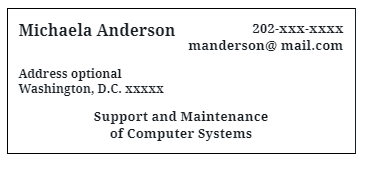
One of the most important business and professional competencies a job seeker can develop is the art of networking. It helps not only in the initial job search, but throughout your entire career.
Networking involves mixing with other professionals in your industry and in other sectors of professional careers, in settings that can be casual or more formal, planned or unplanned and often involving meeting new people with whom there has been no previous relationship. Networking provides resources and expertise for professionals to share information about various business events and news, updates on various types of industry or area developments which could impact jobs and other interesting facts which could affect personal performances or a business’ performance. Contacts may also make suggestions when they have experience in an area being discussed or could offer other resources.
Networking is about building relationships that are mutually beneficial. Networking contacts begin a relationship by demonstrating they can be trusted by showing respect for the other professional. As the relationship grows, each person comes to understand the other as a professional which would make a networking contact likely to recommend or refer a job seeker.

Anyone seeking a new position, perhaps uneasy with networking, may be unaware of the vast array of resources available to support a job search. Networks are actually quite large, with numerous sources to be considered.
Begin by making a list of possible contacts for your job search.
When making an introduction in the professional setting, a common question would be to ask about your interests. Recent graduates may be asked if they have made a decision about their new career search and if the candidate has identified where their job focus will be directed.

Answering this question effectively will help anyone in a job search. Having a vague response and not identifying a focus area will not provide your network contact with enough information to assist you with your search. Perhaps use a brief example or story to help illustrate your point. Most people enjoy stories, which are easier to remember, so creating an answer that includes a short example of how a problem was solved or how a great idea was developed, will be memorable and help create a sense of why you should be considered for a job.
Contacts Count (www.contactscount.com), a nationwide firm specializing in business networking, has a simple formula that can be used to develop an answer. It involves two parts:
Example:
A job seeker wants to get an information technology job such as a computer systems administrator. The candidate excels in determining space requirements and what upgrades a company might need and has just completed such a project as a volunteer at a local non-profit organization.
When the candidate puts the two together, they have a clear, concise and compelling way to answer the question “What are your job interests?”:
“I have been working as a volunteer at the local non-profit to identify their space requirements for the addition of a new contact management system and website. I was able to determine the appropriate upgrades and recommended new software. Over the past month, I have insured the existing hardware can support the newly installed software. I would like to find a permanent position to support and maintain the company’s computer system.”
This answer helps networking contacts visualize the type of job the candidate desires. Individuals without current employment and/or new graduates can use volunteer experiences, sports or club teams examples and leadership in extracurricular activities to demonstrate their interests. Hearing this information, networking contacts may be able to think of companies that need that type of skill. Specific and vivid answers will be most helpful.
Networking cards are similar to business cards, with contact information and a brief description of the candidate’s interests. The goal is to make it easy for contacts, with whom the candidate has discussed their job interests, to get back in touch, especially if another job has come to their attention.
There are four essential things to include on the cards:
Including an address is optional but could be helpful if information needs to be mailed.
Sample Card:

Carrying these cards at all times is beneficial in the job search because networking opportunities can happen everywhere. Cards can be designed using a template and printed on business card stock, which is easy to locate at such places as Staples or Office Depot or online sites such as www.vistaprint.com, provide free cards (there is a shipping and processing charge).
There is expected conduct and etiquette during networking or other professional events that will present you as professional, offering contacts and referral sources assurance in recommending you for a new position.
Keep the following tips in mind:
Being uncomfortable with networking should not prevent a candidate from being effective. There are suggestions to help job candidates feel at ease, particularly if the candidate is shy or reserved and uncomfortable opening the conversation.
Being introverted or feeling uncomfortable at networking events is not uncommon, but it is still possible to be successful at networking events. People who are more reserved, usually listen well and will be able to gather valuable information. Asking good questions is the key to getting good information. By having a few questions prepared, as well as responses to possible questions to be asked at the event, the candidate can be successful and feel at ease.
Planning ahead of the event can help ease anxiety and below are other suggestions to make the experience more comfortable:
Remember, most people welcome conversation and may be introverted as well. By deciding to enjoy the evening and find ways to laugh, the event can be a success.